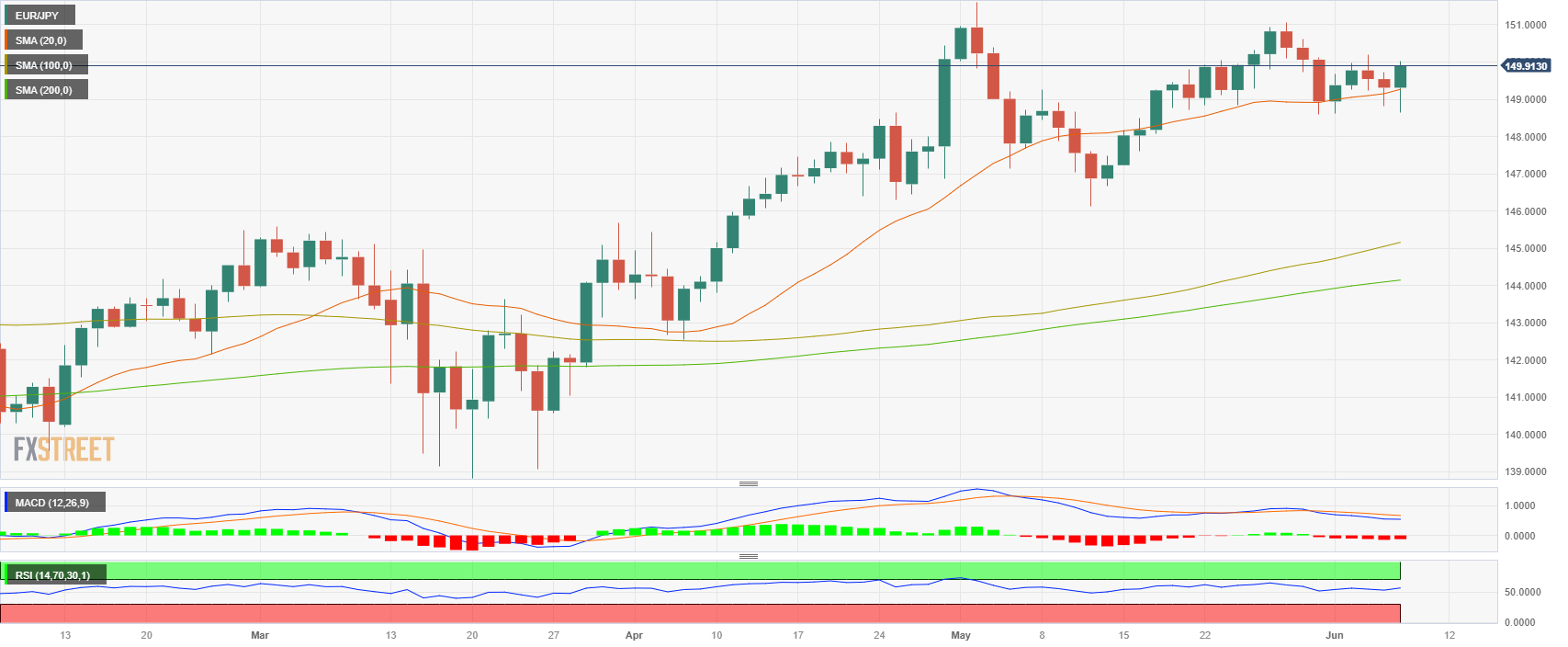- Analytics
- News and Tools
- Market News
- EUR/JPY advances slightly after Japanese data
EUR/JPY advances slightly after Japanese data
- EUR/JPY rises after GDP in Q1 for Japan surprisingly contracted by 0.3%.
- Current Account showed a surplus and Trade Balance deficit in April.
- Eyes on Eurozone GDP data on Thursday.
At the beginning of Thursday’s Asian session the EUR/JPY rose after Japan reported strong Current Account data but a Trade Balance deficit. In addition, the Q1 Gross Domestic Product (GDP) unexpectedly contracted. As a reaction, the EUR/JPY increased slightly to the 149.88 area. For the rest of the session, GDP data from the Eurozone (EZ) may have a further impact on the pair.
Japan released mixed economic data
The Cabinet Office from Japan reported that the Gross Domestic Product (GDP) contracted by 0.3% (QoQ) in Q1 while the markets expected a 0.5% expansion from the previous 0.4% quarterly reading. However, the annualized rate showed an expansion of 2.7% from its previous 1.6%. In addition, the Ministry of Finance reported a ¥1,895B Current Account surplus but a ¥113.1B Trade Balance deficit, which came better than the consensus.
On Thursday, the EZ will report GDP data from Q1, which is expected to have stagnated in the quarterly reading and a slight deceleration in the annualized rate from 1.3% to 1.2%.
Levels to watch
According to the daily chart, the EUR/JPY exchange rate holds a neutral to bullish outlook for the short term as the market enters a period of consolidation. However, technical indicators remain positive, indicating that the market may be preparing for another leg up.
If EUR/JPY manages to move higher, the next resistances to watch are at the 149.80 zone, followed by the 150.00 area and the 150.50 level. On the other hand, The 20-day Simple Moving Average (SMA) at the 149.40 level is key for EUR/JPY to maintain its upside bias. If it is breached, a more pronounced decline towards the 148.50 area and 148.00 zone could come into play.
EUR/JPY daily chart

© 2000-2026. All rights reserved.
This site is managed by Teletrade D.J. LLC 2351 LLC 2022 (Euro House, Richmond Hill Road, Kingstown, VC0100, St. Vincent and the Grenadines).
The information on this website is for informational purposes only and does not constitute any investment advice.
The company does not serve or provide services to customers who are residents of the US, Canada, Iran, The Democratic People's Republic of Korea, Yemen and FATF blacklisted countries.
Making transactions on financial markets with marginal financial instruments opens up wide possibilities and allows investors who are willing to take risks to earn high profits, carrying a potentially high risk of losses at the same time. Therefore you should responsibly approach the issue of choosing the appropriate investment strategy, taking the available resources into account, before starting trading.
Use of the information: full or partial use of materials from this website must always be referenced to TeleTrade as the source of information. Use of the materials on the Internet must be accompanied by a hyperlink to teletrade.org. Automatic import of materials and information from this website is prohibited.
Please contact our PR department if you have any questions or need assistance at pr@teletrade.global.















